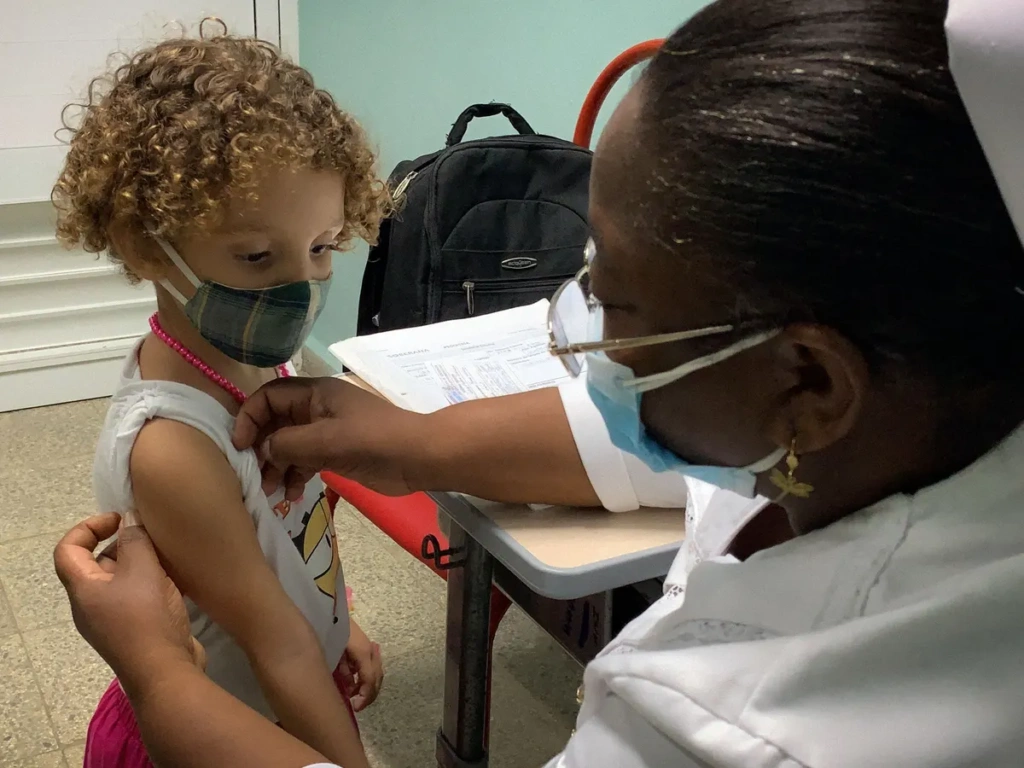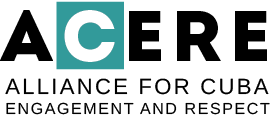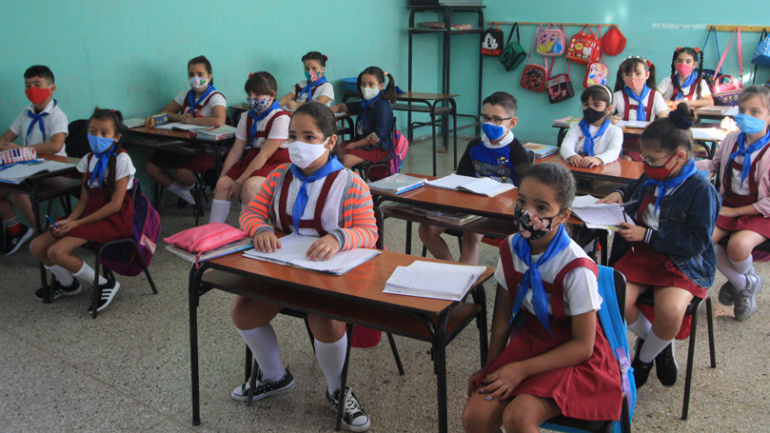U.S. EMBARGO AND SANCTIONS ARE DESIGNED TO CAUSE ECONOMIC CRISIS

- For 60 years, the United States has maintained an economic, commercial and financial embargo (also commonly referred to as a “blockade”) against Cuba. The embargo’s explicit purpose – as stated by a secret State Department memorandum in 1960 – is to “to bring about hunger, desperation and overthrow of government.” The United Nations has called out the embargo by noting “the restrictions imposed [] help to deprive Cuba of vital access to medicines, new scientific and medical technology, food, chemical water treatment and electricity.”
- Under the Trump administration, 243 additional sanctions and measures were implemented against Cuba, including in the context of the pandemic. These measures include “trade control, suspension of aid and technical assistance, freezing of the target’s financial assets, and the blacklisting of foreign companies involved in trade with Cuba.” The inevitable and intended result has been shortages of food, fuel, basic goods and medical supplies.
- Calls by the United States to other countries to refuse medical brigades of Cuban doctors impeded Cuba’s COVID-19 global response, as well as interfered with an important source of income for the country that had helped to offset the impact of sanctions, as noted by a United Nations independent expert.
- In 2020, President Trump severely restricted the possibility for most Cuban-Americans to send remittances to family members in Cuba, a significant source of income for many Cubans. In 2018, remittances totaled $3.7 billion. By adding FINCIMEX, a Cuban financial institution, to the Restricted List, international remittance services, including Western Union, halted all services to Cuba.
- Weeks before the Trump presidency ended, the State Department designated Cuba a state-sponsor of terrorism, placing it on a list that it had been removed from under President Obama. Adding Cuba back to the list means that third-party countries, businesses and institutions have been unable to engage in trade with Cuba without facing risk of serious sanctions by the United States.
- Under Trump, the Restricted List exponentially grew to now include over 200 Cuban entities.
- The international community, including international non-governmental organizations, has long called out the illegality and immorality of the embargo. In addition, for 29 consecutive years, member states of the United Nations have, in a near unanimous vote, condemned the embargo. In 2021 the only support for the embargo came from the United States and Israel.
- “Sanctions make it harder for entire populations to stay healthy and hamper the transportation of goods needed for economic development, result in the waste of natural resources, undermine environmental sustainability and achievement of the Sustainable Development Goals,” UN human rights experts said in August 2021. “Activities essential to every country’s development suffer when unilateral sanctions are imposed.” The experts said people in targeted countries like Venezuela, Cuba, Syria and Iran sink into poverty because they cannot get essential services like electricity, housing, water, gas and fuel, let alone medicine and food.
US sanctions affect access to medicines, equipment and Cuba’s pandemic response
- While the sale of medical supplies and equipment may not be directly subject to sanctions by the U.S. government, the complex legal landscape makes it extremely difficult for medical or pharmaceutical companies to do so. If found to not comply with any one of a series of pre-requisites and restrictions, they may face heavy fines by the U.S. Treasury Department. As a result, the chilling effect for companies and banks engaged in such transactions severely limits, if not halts altogether, any such sales or transfers.
- Donations of medical supplies encounter similar difficulties. For example, in March 2020, when the Jack Ma Foundation tried to send COVID relief to Cuba (PPE, ventilators, diagnostic kits), the cargo carrier Avianca Airlines declined to carry the aid because its major shareholder is a U.S.-based company that would be subject to the trade embargo on Cuba and face sanctions.
- According to the lead developer of one of the Cuban COVID vaccines, Soberana 2, Cuba had to slow down production due to lack of components. The U.S. companies Cuba had relied on “suddenly told us they can no longer continue.” This slowdown allowed the virus to spread more widely and led to more deaths.
- During the pandemic, two Swiss companies that had previously sold Cuba ventilators said they could no longer continue trading with the island after they were bought out by Vyaire Medical, an Illinois company.
- Before the pandemic became widespread in Cuba, the U.S.-based Global Health Partners campaign to send six million syringes to Cuba lost critical time, time that could have saved Cuban lives, trying to find a U.S. producer willing to sell syringes to be used in Cuba.
- Three Swiss organizations denounced the extratorrial reach of sanctions, which prohibited Swiss banks from transferring necessary funds to Cuba to allow for an emergency shipment of medical supplies, despite Switzerland maintaining strong relations with Cuba.
- In 2020, the Department of Transportation denied two U.S. cargo flights scheduled to deliver humanitarian aid to Cuba – including food, medicine and medical supplies – because it was not “in the foreign policy interests of the United States.”
- United Nations Special Rapporteur on the negative impact of unilateral coercive measures on the enjoyment of human rights issued a report condemning the U.S. embargo against Cuba, noting in particular that Swiss companies could not ship medical equipment to Cuba after being acquired by a
U.S. company, nor could Swiss humanitarian organizations transfer money for medical collaborations and support in Cuba as a result of the extraterritorial application of the embargo. - The sanctions imposed in the past several years on Cuba, combined with the “blacklisting” of individuals and entities and a significant decrease in remittances and trade restrictions, have had a severe effect on Cuba’s overall financial position. This directly impacts the government’s ability to produce or purchase necessary medical equipment, supplies and medicines to respond to the pandemic.
US sanctions affect food shortages
- Cuba imports 70% of its food, and throughout the pandemic, the country has experienced severe food shortages.
- The lack of tourist income for the country as a result of public safety measures taken to reduce the exposure to COVID-19, combined with the virtual elimination of remittances by Trump, have significantly hampered Cuba’s ability to generate sufficient income to purchase the food it needs to feed its citizens.
- In March 2020, UN Special Rapporteur on the Right to Food said that sanctions against Cuba “severely undermine[] the ordinary citizens’ fundamental right to sufficient and adequate food” and that “it is now a matter of humanitarian and practical urgency to lift unilateral economic sanctions immediately.”
Misinformation, inaccurate and misleading information have historically been fomented, financed, orchestrated, written, coordinated and disseminated by U.S.-funded institutions, actors and organizations
- Every year, the U.S. authorizes at least $20 million, primarily through the U.S. Agency for International Development (USAID), to individuals, groups and organizations based in Florida and Cuba for “democracy activities,” which overwhelmingly concentrate on media outlets, including television, radio and social media outlets that are hostile to the Cuban government.
- Every year the U.S. also spends about $28 million for the Office of Cuba Broadcasting, which runs Radio & TV Martí, and has 117 employees. These stations, which are barely heard in Cuba because of government blocking, have become merely a cash cow for its managers and staff in Florida
- While the Biden administration is investigating ways to expand internet access in Cuba, the embargo currently affects the ability of Cuban citizens and tourists, including U.S. citizens or residents, to access nearly 50 platforms, websites and social media applications. These sites include broadly accessed ones like Zoom, Snapchat and at least 20 Google platforms.
- Cuban medical personnel have denounced the Biden administration’s campaigns of misinformation about its medical system, vaccines and COVID-19 response, as well as its utter disrespect for the work of front-line health care workers in Cuba and abroad.
Misinformation campaigns led abroad played a central role in the J11 protests and overall ignored the economic demands of the Cuban people who were denouncing island-wide shortages of basic necessities.
- Focusing exclusively on the race of some of the protestors – as some U.S. media outlets have done – completely misunderstands Cuba’s population and the prevalence of Afro-Cubans in all sectors, spheres and geographies. Citizens are not being targeted because of their race, but rather their actions that violate the law. In contrast, in the U.S. law enforcement has a long and well-documented history of targeting citizens specifically because of their race, even when their actions are law-abiding. Just recently another young Black man, Jayland Walker, was murdered by 60 bullets shot at him by police officers based on a traffic stop.
- Describing the economic protests as racialized distorts the nature of the claims and demands of the Cuban citizens who were protesting their bleak economic conditions and lack of access to basic necessities, such as food and medicine. Cubans of all backgrounds are affected by US sanctions, the embargo, and global phenomena like the pandemic, inflation and gas shortages, which only serve to exacerbate their hardship. In the U.S., Black citizens and people of color are disproportionately affected by food insecurity, lack of access to quality, affordable health care (that is not racialized), equal pay, and secure and dignified housing – all of which have documented histories of state-sponsored or sanctioned racism and discrimination.
- Every person charged with breaking the law on July 11, 2021 has guaranteed constitutional protections and rights, starting with low-cost legal representation. Charges leveraged are not based on ideological differences, rather for unlawful actions that violate their laws establishing public order. However, the U.S. has a long and tainted history of political persecution and prosecution, especially in communities of color and among those seeking to challenge the established economic order.
- There is a long history in Cuba of small protests that are organized, financed, planned, or commanded by foreign agents – including the U.S. government – in order to spark a rebellion and overthrow the Cuban government. Cuba’s investigation into some individuals’ behavior on July 11, 2001 that call for or incite political change or violence outside of established democratic, electoral and political processes is allowed under its laws in order to protect public order and security. It is significant to note that in the U.S. an unprecedented insurrection was committed months prior in the Capitol by white nationalists who were intent on overthrowing the government and committing violent acts against U.S. officials – all supported and sponsored by the President. Overwhelmingly those actions have been repudiated by the majority of U.S. citizens who not only do not believe those actions reflect democratic values, but instead have insisted on investigations to determine culpability up to the highest levels.
- According to Cuban criminal justice system officials, over 90% of criminal cases in Cuba proceed to trial (the opposite of the U.S., where plea bargains are the standard practice). Trials are generally composed of a panel of judges that include a mix of professional judges and lay persons from the community. Trials proceed as they do in most places: presenting evidence by the prosecutor which can be disputed by the defense counsel before an impartial arbiter of justice.


